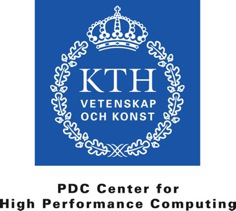Lilit Axner
(PDC - Center for High-Performance Computing)
23/08/2010, 09:15
Parallel Programming
This lecture gives you an overview of MPI functionality
and discuss the value of having a standard message
passing library. It provides a tailored tour of the basic
concepts and mechanisms that will be of most value to
you as beginning MPI programmers. This includes
gaining a familiarity with some of the most commonly
used MPI calls, the way in which MPI is initialized and...
Lilit Axner
(PDC - Center for High-Performance Computing)
23/08/2010, 10:15
Parallel Programming
In point to point communication, one process sends a
message and a second process receives it. This is in
contrast to collective communication routines, in which a
pattern of communication is established amongst a
group of processes. This lecture will cover the different
types of send and receive routines available for point to
point communication.
Lilit Axner
(PDC - Center for High-Performance Computing)
23/08/2010, 13:15
Parallel Programming
Lab exercises to accompany the material on the basics of
MPI programming
Lilit Axner
(PDC - Center for High-Performance Computing)
23/08/2010, 15:15
Parallel Programming
Lab exercises to accompany the material titled "Point-to-
Point Communication I"
Lilit Axner
(PDC - Center for High-Performance Computing)
24/08/2010, 08:30
Parallel Programming
During this question and answer period, we will discuss
questions that came up from yesterday's lectures and labs
on MPI Basics and Point-to-Point Communication.
Michaela Lechner
(PDC - Center for High-Performance Computing)
24/08/2010, 09:15
Parallel Programming
MPI Point to Point Communication I introduced many of
the routines related to sending a message between two
processes, with a focus on programming with blocking
and non-blocking routines. This lecture will discuss
another important area: communication mode. Choosing
a communication mode gives the programmer some
control over how the system handles the message and
can improve...
Michaela Lechner
(PDC - Center for High-Performance Computing)
24/08/2010, 10:15
Parallel Programming
There are certain communication patterns that appear in
many different types of applications. Rather than
requiring each programmer to code these using point to
point communication, MPI provides routines that handle
these patterns for you, called collective communication
routines. This lecture will survey these routines, the
communication pattern established, and their syntax.
Michaela Lechner
(PDC - Center for High-Performance Computing)
24/08/2010, 13:15
Parallel Programming
The lab that accompanies the material titled "Point-to-Point
Communication II"
Michaela Lechner
(PDC - Center for High-Performance Computing)
24/08/2010, 15:15
Parallel Programming
The lab that accompanies the material titled "Collective
Communication I"
Michaela Lechner
(PDC - Center for High-Performance Computing)
25/08/2010, 08:30
Parallel Programming
During this question and answer period, we will discuss
questions that came up from yesterday's lectures and labs
on MPI Point-to-Point Communication II and Collective
Communication.
Olav Vahtras
(PDC - Center for High-Performance Computing)
26/08/2010, 09:15
Parallel Programming
When OpenMP is used in conjunction with the Message
Passing Interface (MPI), the result can provide a second
level of parallelism which has the possibility to gain the
greater efficiency on clusters of SMP nodes. In this lecture,
we will show how to do such hybird programming by using
examples.
Olav Vahtras
(PDC - Center for High-Performance Computing)
26/08/2010, 10:15
Parallel Programming
A continuation of the lecture on MPI + OpenMP (i.e., hybrid)
programming
Olav Vahtras
(PDC - Center for High-Performance Computing)
26/08/2010, 13:15
Parallel Programming
In this lab exercise, you will parallelize some simple
algorithms using shared memory programming (OpenMP)
and distributed memory programming (MPI)
simultaneously.
Olav Vahtras
(PDC - Center for High-Performance Computing)
27/08/2010, 08:30
Parallel Programming
During this question and answer period, we will discuss
questions that came up from yesterday's lectures and labs
on MPI + OpenMP (i.e., hybrid) programming.
Olav Vahtras
(PDC - Center for High-Performance Computing)
27/08/2010, 09:15
Parallel Programming
A virtual topology is a mechanism for naming the processes
in an MPI communicator in a way that fits the
communication pattern better. In this lecture we cover the
basic concept behind virtual topologies, the main MPI calls
used to achieve it, and some examples.
Olav Vahtras
(PDC - Center for High-Performance Computing)
27/08/2010, 10:15
Parallel Programming
A continuation of the lecture on MPI virtual topologies

